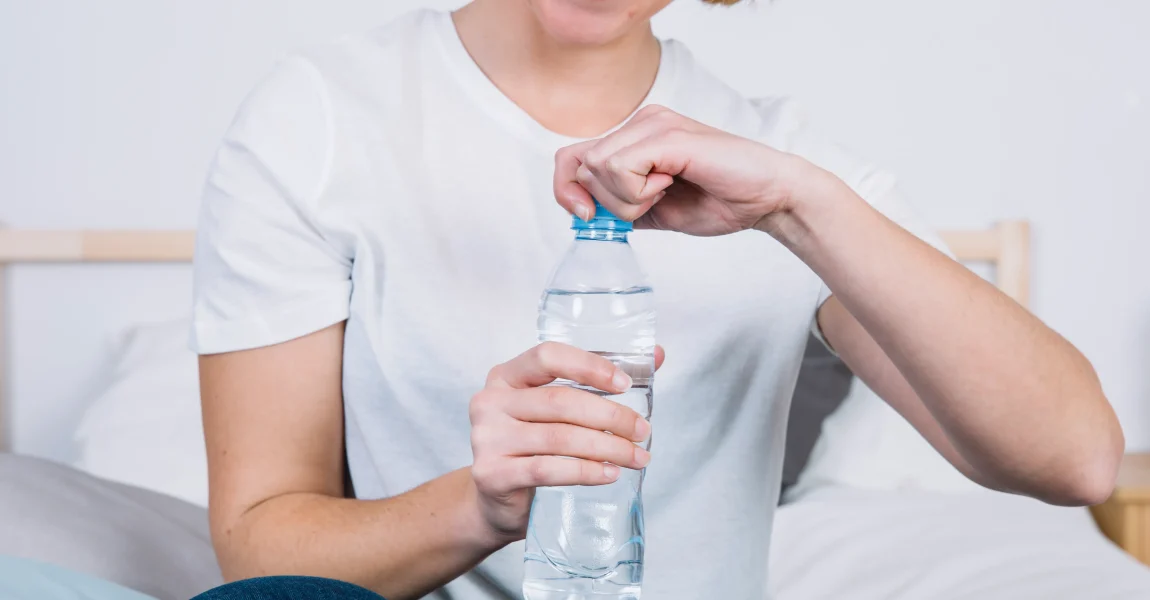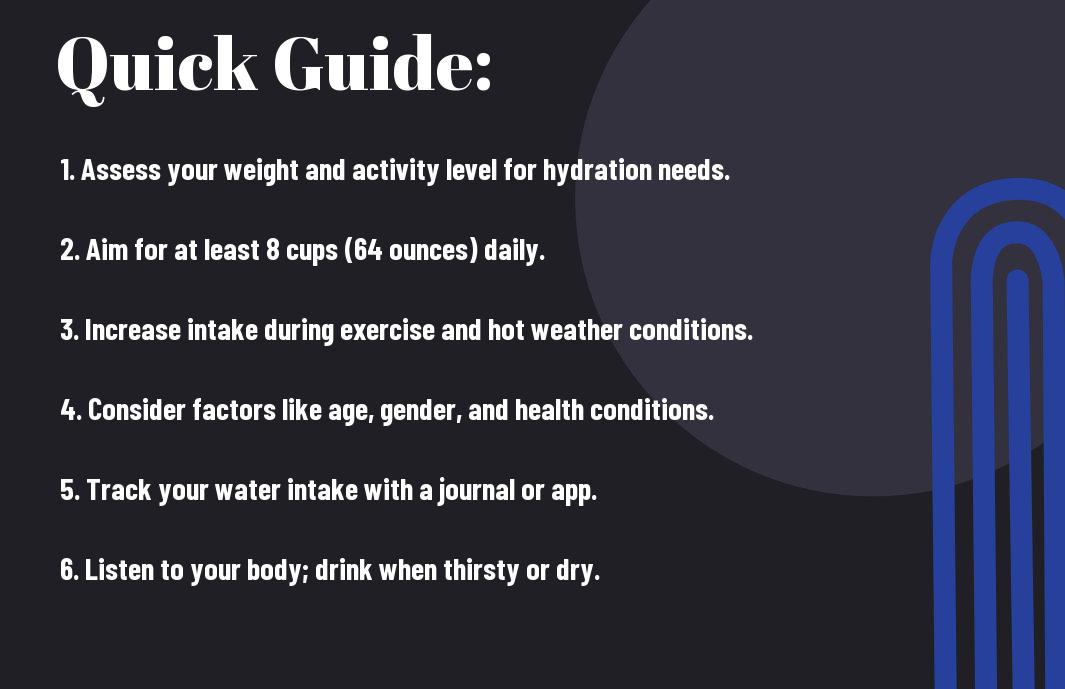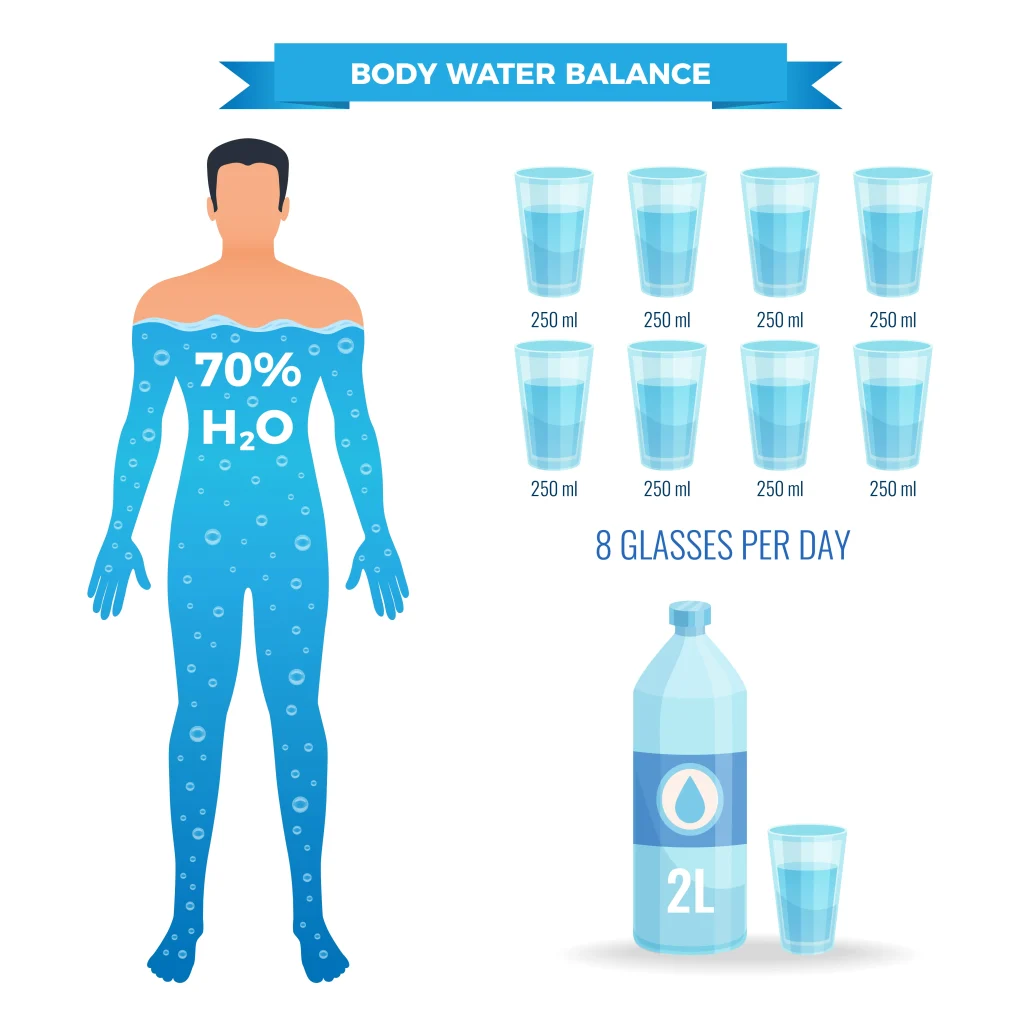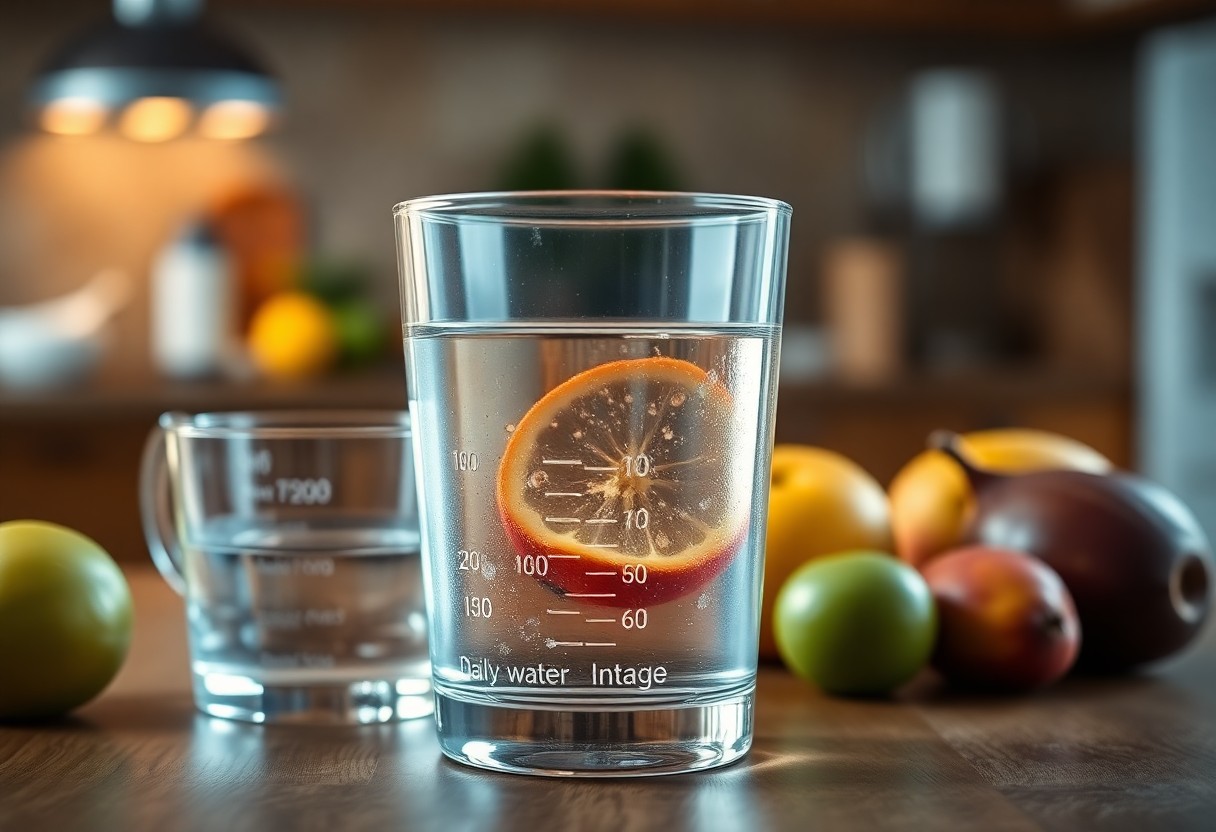
Many people underestimate the importance of hydration for overall health. Understanding how much water you should drink daily can significantly impact your well-being, to avoid dehydration and support your energy levels. While individual needs may vary, general guidelines suggest aiming for about 8 to 10 cups of 250ml water per day. Factors like activity level, climate, and health conditions can influence your hydration needs. In this guide, you will learn effective ways to assess your hydration requirements and tips to easily meet them.

Contents
Types of Water Intake
To maintain optimal hydration, it is important to understand the different types of water intake, as each contributes to your body’s overall fluid balance and health. Here are some key categories:
- Plain Water
- Dietary Fluids (e.g., juices, milk)
- Food Intake (e.g., fruits, vegetables)
- Hydration Supplements
- Caffeinated Beverages (e.g., tea, coffee)
Thou can maximize your hydration by incorporating a variety of these sources into your daily routine.
Daily Water Requirements
One of the best ways to gauge your hydration needs is by assessing your daily water requirements based on factors like age, gender, and activity level. The general guideline is around 3.7 liters for men and 2.7 liters for women, inclusive of all fluids consumed. Adjustments may be necessary based on your climate and exercise habits.

Different Sources of Hydration
Intake can come from various sources, and understanding this diversity is important for effective hydration. Not only does plain water account for a significant portion, but fluids from foods and other beverages are also vital. Prioritizing a mix enhances your fluid balance throughout the day.
Water is not the only way to meet your hydration needs; other beverages and food items also play a significant role. For instance, fruits like watermelon and oranges contain high water content, while soups can also be a savory way to boost your intake. However, be cautious with alcohol and caffeinated drinks, as they can lead to dehydration instead of aiding hydration. Verifying your overall water consumption will ensure you stay properly hydrated.
Factors Influencing Water Needs
Now, understanding the factors that influence your water needs is crucial for maintaining good health. Consider the following:
- Age
- Gender
- Climate
- Activity level
After recognizing these variables, you can assess how much water you should be drinking daily. For more insights on this topic, check out What’s a healthy amount of water to drink? : r/nutrition.
Age and Gender
Water intake differs based on your age and gender. Older adults may require less water due to lower physical activity and body composition changes, while younger individuals typically have higher needs. Additionally, males generally need more water than females due to differences in body mass and metabolic rates.
Climate and Activity Level
An increase in temperature and humidity can elevate your water requirements. If you live in a hot climate or engage in intense physical activities, you’ll need to replenish lost fluids adequately.
Needs can vary significantly based on environmental conditions and exercise habits. In hot weather, dehydration occurs faster, necessitating higher fluid intake. Similarly, if you are engaging in strenuous workouts, consuming adequate water is crucial to maintain performance and prevent fatigue. You should keep an eye on signs of dehydration like thirst, dry mouth, and fatigue to ensure you’re meeting your unique hydration needs.
Tips for Staying Hydrated
Not everyone realizes how important it is to maintain proper hydration. To ensure you’re drinking enough water, try these tips:
- Carry a water bottle with you throughout the day.
- Infuse your water with fruits or herbs for enhanced flavor.
- Set reminders on your phone to drink at regular intervals.
- Track your daily water intake using an app.
- Make it a habit to drink a glass of water before each meal.
Any small change can help you stay adequately hydrated.
Monitoring Your Intake
Little adjustments can significantly impact your hydration levels. Keeping track of how much you drink each day makes it easier to meet your water consumption goals. Consider using an app, keeping a journal, or simply marking your progress on a water bottle. Feeling more energetic and focused is often a direct result of proper hydration!
Signs of Dehydration
You may not realize you’re becoming dehydrated until it becomes an issue. Common signs include dry mouth, fatigue, dizziness, and dark-colored urine. Being aware of these symptoms will help you act quickly, ensuring you stay healthy.
Monitoring your hydration is vital, especially as dehydration can lead to serious complications like confusion, heat exhaustion, and kidney stones. If you notice a significant decrease in your energy levels or unusual changes in your body, it may indicate severe dehydration. Staying aware of your body’s signals can help you maintain optimal health and well-being.
Step-by-Step Guide to Hydration
Unlike the common belief that you should drink eight glasses of water a day, hydration needs vary by individual. It’s vital to tailor your water intake based on various factors such as body weight, climate, and activity level. Here’s a simple breakdown:
| Factor | Daily Water Intake Recommendation |
|---|---|
| Average Adult | 2.7 to 3.7 liters |
| Active individual | 3-4 liters |
| Hot climate | 4-5 liters |
Creating a Daily Water Schedule
Schedule your water intake by dividing your goal into smaller, manageable portions throughout the day. For example, aim to drink a glass of water after each meal and snack. This structured approach keeps you on track and ensures you stay properly hydrated without overwhelming yourself.
Tools and Apps to Help
Now, leveraging technology can make hydration easier. Several apps remind you to drink water based on your personalized hydration goals, helping you stay consistent throughout the day.
Another option is to choose hydration tracking apps that allow you to set daily targets and log your intake. Many of these apps offer features such as custom alerts and even integration with fitness devices. You can find tools that recommend ideal intake based on your activity level and send notifications to remind you to drink regularly, thus positively impacting your overall well-being. Making hydration a priority with these aids can lead to better health outcomes.

Pros and Cons of Increased Water Intake
Once again, understanding the pros and cons of increasing your water intake can help you make informed choices for your health. Below is a detailed breakdown:
| Pros | Cons |
|---|---|
| Improved hydration | Possible overhydration |
| Enhanced physical performance | Frequent urination |
| Better digestion | Electrolyte imbalance |
| Clearer skin | Water intoxication |
| Increased energy levels | Dependence on water consumption |
Health Benefits
You can enjoy several health benefits when you increase your water intake. Staying adequately hydrated supports digestion, enhances nutrient absorption, and keeps your skin looking youthful. Moreover, consuming enough water can lead to improved concentration and cognitive function, making it easier to stay productive throughout the day.
Potential Risks
For some individuals, drinking excessively can lead to potential risks that shouldn’t be ignored. Although hydration is crucial, pushing your limits may result in negative health outcomes.
Cons of increased water intake include overhydration, which can disrupt your body’s electrolyte balance, potentially leading to symptoms like nausea and headache. In extreme cases, this can result in a severe condition called water intoxication, which may require medical attention. Frequent urination can also disrupt daily activities, particularly if you find yourself needing to use the restroom often. It’s crucial to find a comfortable balance with your water consumption to maximize the benefits while minimizing potential risks.
Summing up
So, understanding how much water you should drink daily can greatly enhance your overall health and well-being. Aiming for about 2 to 3 liters—or around 8 to 12 cups—daily can help maintain proper hydration. Individual needs may vary, influenced by factors such as activity level, climate, and overall health. Listen to your body and adjust your intake based on thirst and urine color for optimal hydration. Making these adjustments can lead to better energy levels, clearer skin, and improved bodily functions.
FAQ
Q: How much water should I drink daily?
A: The general recommendation for daily water intake varies, but a common guideline is about 8 cups (64 ounces) for the average adult. However, individual needs can differ based on factors like age, weight, activity level, and climate. Some health experts suggest a more personalized approach, estimating half your body weight in ounces as a baseline. For example, if you weigh 150 pounds, aim for 75 ounces of water each day.
Q: Does my water intake need to increase with exercise?
A: Yes, if you are physically active, you may need to drink more water to replace the fluids lost through sweating. For moderate exercise, consider adding an additional 1.5 to 2.5 cups (approximately 12 to 20 ounces) of water per hour of activity. If your workouts are intense or longer than an hour, electrolyte-rich drinks can also be beneficial to replenish lost salts.
Q: Can I count other beverages towards my daily water intake?
A: Yes, other beverages such as herbal teas, milk, and even coffee can contribute to your overall hydration. However, it’s best to avoid sugary drinks and excessive caffeine, as these can have a diuretic effect and may lead to dehydration in excess. Fresh fruits and vegetables also contain water and can contribute to your hydration needs.
Q: How can I tell if I’m drinking enough water?
A: Common signs of adequate hydration include clear or light yellow urine, normal thirst levels, and a general feeling of well-being. Conversely, dark yellow urine, persistent thirst, fatigue, and dry skin may indicate you need to drink more water. Pay attention to your body’s signals and adjust your intake accordingly.
Q: Are there any risks associated with drinking too much water?
A: Yes, while staying hydrated is important, excessive water intake can lead to a condition known as hyponatremia, or water intoxication, where sodium levels in the body become dangerously low. This is particularly a concern in endurance sports or extreme hydration methods. It’s wise to listen to your body, drink to thirst, and consult a healthcare provider if you have concerns about your hydration levels.
- April 18, 2025
- Health
